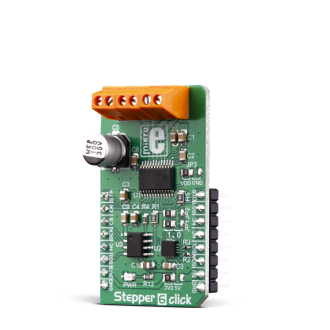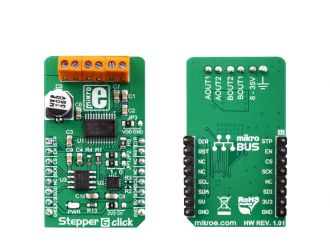
We strongly encourage users to use Package manager for sharing their code on Libstock website, because it boosts your efficiency and leaves the end user with no room for error. [more info]

Rating:
Author: MIKROE
Last Updated: 2018-10-31
Package Version: 1.0.0.0
mikroSDK Library: 1.0.0.0
Category: Stepper
Downloaded: 4412 times
Not followed.
License: MIT license
Stepper 6 click is the complete integrated bipolar step motor driver solution. It comes with the abundance of features that allow silent operation and optimal working conditions for the connected motor. A specialized integrated driver chip on this Click board far exceeds the capabilities of similar, commonly used step motor drivers.
Do you want to subscribe in order to receive notifications regarding "Stepper 6 click" changes.
Do you want to unsubscribe in order to stop receiving notifications regarding "Stepper 6 click" changes.
Do you want to report abuse regarding "Stepper 6 click".


Library Description
The library carries everything needed for stepper motor control including speed and acceleration setup. Library is also adjustable to working on different amount of ticks per second, also speed and acceleration can be provided in float format. Buffer used for movement calculation is defined by user so this library can be adjusted for MCUs with very limited RAM resources. Library also offers a choice to choose the stepper working mode and microstep resolution. Check documentation for more details how to use it.
Key functions:
uint8_t stepper6_setSpeed( float minSpeed, float maxSpeed, float accelRatio, T_STEPPER6_OBJ obj ) - Setup motor speedExamples description
The application is composed of the three sections :
void applicationTask()
{
stepper6_start( (T_STEPPER6_OBJ)&myStepper );
while ( myStepper.status.running )
{
stepper6_process( (T_STEPPER6_OBJ)&myStepper );
}
Delay_ms( 2000 );
}
In addition to library function calls example carries necessay Timer ISR and Timer initialization. Check
Timer initialization setings and update it according to your MCU - Timer Calculator.
Additional notes and information
Depending on the development board you are using, you may need USB UART click, USB UART 2 click or RS232 click to connect to your PC, for development systems with no UART to USB interface available on the board. The terminal available in all MikroElektronika compilers, or any other terminal application of your choice, can be used to read the message.